Mozambique: José Jaime Macuane and Eduardo Chiziane selected as consultants to Inclusive Dialogue ...
Mozambique: “Hidden debts” scandal dominates Assembly – AIM report
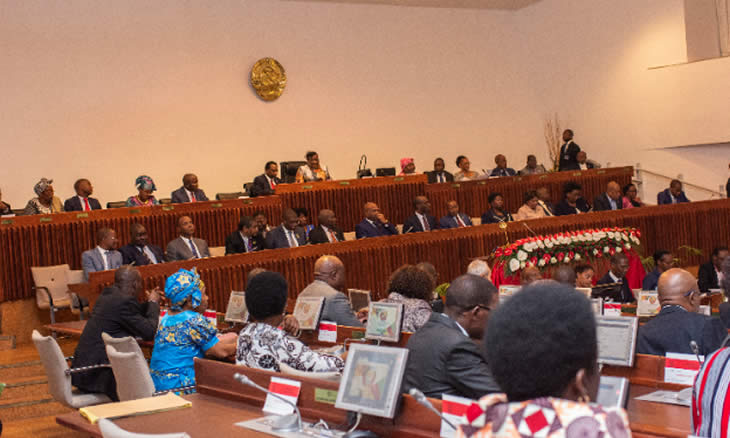
Photo: O País
The enormous scandal of Mozambique’s “hidden debts” dominated Thursday’s opening session of the first sitting this year of the Mozambican Parliament, the Assembly of the Republic.
Both opposition parties, the former rebel movement Renamo and the Mozambique Democratic Movement (MDM), demanded tough action against those responsible for the illegal loans of over two billion dollars from the banks Credit Suisse and VTB of Russia, obtained by three fraudulent companies, Proindicus, EMATUM (Mozambique Tuna Company) and MAM (Mozambique Asset Management).
The scandal hit the front pages with the detention in Johannesburg on 29 December of former Finance Minister Manuel Chang, the man who signed the illicit government guarantees without which the loans would have been impossible.
Chang was detained on the basis of an international arrest warrant issued by the United States authorities who want him to stand trial in New York on charges of conspiracy to commit money laundering, wire fraud and securities fraud.
Chang’s detention brought down the whole corrupt house of cards around the loans. The US indictment contained damning details of the bribes and kickbacks involving officials of Credit Suisse, the Abu Dhabi based company Privinvest, which was the sole contractor for the schemes, and a range of Mozambique government officials. Earlier this month the Mozambican Attorney General’s office ordered the detention of nine people involved in the scandal, including the former head of the Intelligence Service (SISE), Gregorio Leao, the SISE official who was chairperson of all three corrupt companies, Antonio do Rosario, and Ndambi Guebuza, oldest son of former President, Armando Guebuza.
The deputy head of the Renamo Parliamentary group, Mario Ali, said “It is neither fair nor honest to oblige the entire people to pay debts that were contracted for private purposes”.
He said Mozambicans want to see all those involved in the illegal debts arrested tried and obliged to return what they stole from the people. He said the investigations should not stop with Cheng but that former President Guebuza should also be charged.
Ali urged the American and South African justice systems to continue their investigations “in order to help our country clarify this financial rupture and hold the offenders responsible”. He believed that the Mozambican legal system now has “a rare opportunity to clean up its degraded image.
The head of the MDM Parliamentary group, Lutero Simango, claimed the detention of Chang “tore off the veil on the promiscuity between executive and judicial powers in our country”.
He believed the entire country was in the dock “because of the party which has been in government since 1975 (i.e. the ruling Frelimo Party).The globalised world in which we live today is putting on trial the Mozambican legal and political systems”.
Simango too urged criminal proceedings against those responsible for hidden and illegal debts. “The Mozambican State should not accept these debts”, he insisted, “That is, the Mozambican people should not pay”.
The head of the Frelimo parliamentary group, Margarida Talapa, could not bring herself to mention Chang by name, even though he is still a Frelimo Parliamentarian, and was effusively applauded by all other Frelimo Deputies during the 10 years (2005 – 2014) in which he presented Parliament with the annual budget.
Unlike the MDM and Renamo, Talapa did not take a clear position that the Mozambican State should repudiate the illicit debts. Instead she urged the government “to continue focused on efforts to identify the best solutions that safeguard the interests of Mozambicans”.
She insisted that Frelimo “will remain firm in its principles of total intolerance to corruption, to money laundering and to any other form of illegality”.
Talapa urged all Mozambicans to remain calm while awaiting the outcome of the judicial proceedings, “and to remain vigilant against attempts that damage public order and tranquillity”.
Both opposition parties want the Assembly to revoke the 2015 resolution that included the illicit debts in the General State Account (CGE) but Talapa argued this was merely a register of something that had happened and did not amount to legalising the debts. Much less, she added, was it any hindrance to the legal measures underway.
She said the CGE should register any operations which might alter State assets, such as guarantees issued by the State. That registration was necessary so that the Administrative Tribunal, as the external auditor of the CGE could judge it and remit it, with or without reservations, to the Assembly which could then take further action.
“Without the registration in the CGE there would be nothing to judge”, she said.


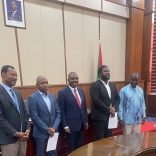

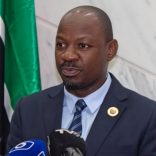
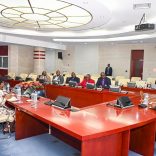
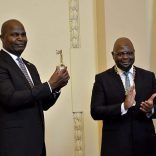
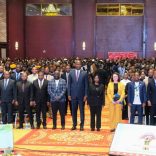





Leave a Reply
Be the First to Comment!
You must be logged in to post a comment.
You must be logged in to post a comment.